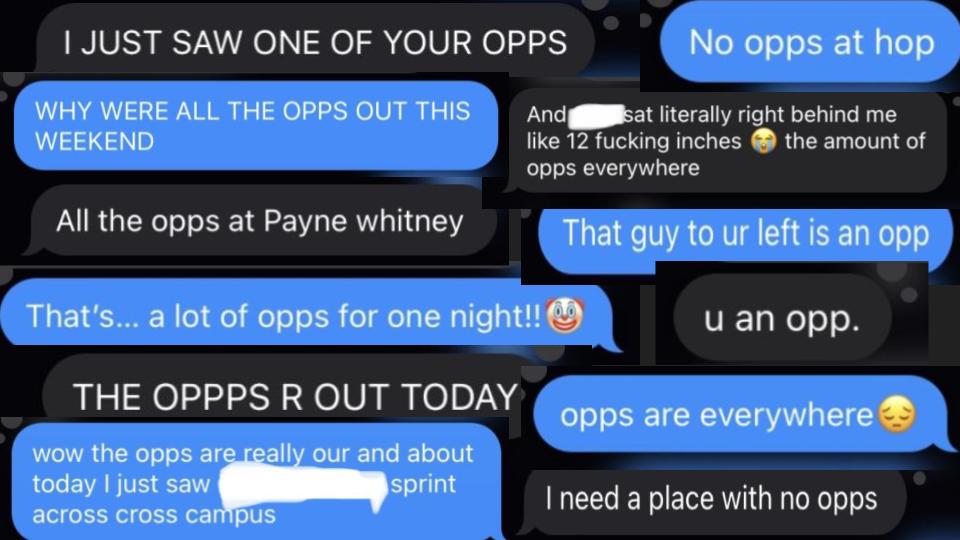
For the purpose of this article, an “opp” is defined as the following:
Opp (noun)
- A person that is, in any way, shape, or form, in opposition to someone else, whether by fact or delusion.
- Ex: an ex-lover, -friend, or -roommate
It was a drizzly March morning when I saw him for the first time in the light of day. He huddled under an umbrella as he rushed along one of the stone walkways that crisscrossed Old Campus, and I hoped beyond hope that he wouldn’t see me. This can’t be how we meet again, I thought as I ran a hand through my rain-soaked hair and dug through my pocket for chapstick to cure my ever-cracked winter lips. As our footsteps brought us closer and closer, I knew there was only one thing left I could do:
Pull out my phone, look down, and pretend that I didn’t see him.
We all have those people that we don’t want to see, whether it’s your ex-suitemate or that messy Halloweekend hookup. It doesn’t seem to matter how much time passes; it’s always weird.
I never had to deal with these so-called “opps” back home — which is ironic for someone from a small town. Maybe that’s because there wasn’t much to do, or maybe it’s because Yale is so much larger that the likelihood of gaining an opp is much higher.
My friends and I now have several opps between us, and unless one of them reads this and tells me otherwise, I think we’ve managed to navigate it pretty well so far. That doesn’t mean it’s been easy, of course, so to help all of you future opp-havers out, I’ve compiled a short guide on how to dodge your opps — or not.
- When debriefing friends on opps in public, use code names. It sounds extremely middle school-esque, I know, but Yale is smaller than you think it is. What the opps don’t realize is that they’re not just your opp. You’re going to discuss your opps with your friends, because why wouldn’t you? And thus, they will now become the shared opp of you and your closest friends. When having these debriefs, it’s safest to just assume that someone will overhear so avoid name-dropping. There’s nothing worse than a text from an opp saying that they heard you were talking about them. Some of my favorite past code names that I’ve heard/used include Dairy, Tostito and Rotisserie Chicken.
- Mark your territory. Not like a dog — that would be weird. By this, I just mean that you shouldn’t let yourself be chased out of the spaces you love. Don’t avoid the Berkeley dining hall just because your opp is in Berkeley. You belong just as much as they do. There are 13 other dining halls for a reason. If they want to avoid you, they can eat somewhere else, which brings me to my next point:
- Recognize that you are the opp of your opps. Let that sink in. It’s important to be self aware. Do with this what you will.
- Explore new places. This is not to counter #2, but to add to it. If, for instance, you decide that seeing your ex is a little too painful, avoiding your opps could be a great excuse to explore somewhere new! If we’re still going on the example of dining halls, I recommend Hopper and TD. No one ever goes there, so they’ve got an opp-free guarantee!
- Travel in a pack. Seeing an opp in public is so much better with friends than when you’re alone — although the latter is when it always seems to happen. When you’re with friends, opp-spotting transcends awkwardness and just becomes funny. But if you do happen to be alone, then:
- Remember that it’s all for the plot. If you see “Rotisserie Chicken” while you’re walking to section, so what? It’s funny. It’s unserious. You’re the main character, and the TV show of your life just needed a little spice to bring the ratings up, so the producers decided to bring back that one character from season two; that’s all it is.
- Pretending you don’t see your opp is usually pointless. 95 percent of the time, they can tell you’re pretending because they’re doing the exact same thing: burying their head in their phone so they can pretend they don’t see you. This might be a fine arrangement for some people, and if it works for you, great! Just don’t delude yourself into thinking they didn’t notice, because they did, and it was just as awkward for them as it was for you.
- Don’t be afraid to say hello. This goes against my earlier anecdote and might seem counterintuitive, but trust me: acknowledging your opps early on can help prevent the awkwardness that lingers from the embarrassing breakup/hookup/falling out you had. You don’t have to avoid them. In fact, maybe opps aren’t meant to be dodged at all. Aren’t we mature enough to be cordial to one another and not dwell on drama of the past? Can’t we move on with our lives? Acknowledging your opps is almost like dethroning them. It’s asserting your dominance; it’s saying, “I’m not scared of seeing you anymore. You don’t matter to me.” And isn’t that a beautiful thing? Both me and my friends have un-opped several opps this way.
Now that I’ve broken the record for using the word “opp” the most in a single publication, I hope you’ve gotten a better grasp on how to broach the awkwardness of opp-ness. Whether you decide to un-opp or plan to just avoid them for the rest of eternity, there are plenty of ways to dodge your opps. There’s no one-size-fits-all solution because every opp is different. But as the great William Shakespeare once said, “to opp, or not to opp: that is the question” — and only you can answer it.







